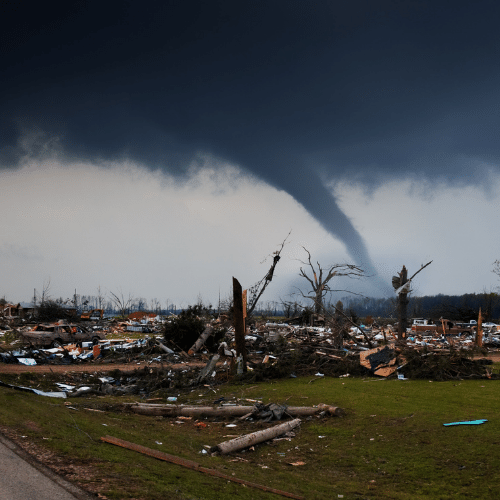Switzerland has also been affected by various natural disasters throughout its history. Moreover, the implementation of effective risk management strategies is part of Swiss know-how. To avoid a disaster in Switzerland, prevention is implemented according to cantonal and national legislation. Moreover, its industry is largely shaped by the world of insurance. At first glance, Switzerland is therefore a country rather borrowed from security! But will we be able to face the events to come?
What are the key disasters that have occurred in Switzerland?
In general, disasters in Switzerland are rather rare and these relate to the climate. Here is a brief summary of the latest natural disasters since 1800.
1816 – A year without a summer
The entire planet and therefore Switzerland are experiencing the consequences of climate change linked to an ash cloud caused by the Tambora volcano in Indonesia. With a global drop in the earth's temperature, harvests are catastrophic in almost all countries of the world. This will cause a great famine in Switzerland.
1868 – Heavy floods
In 1868, Switzerland experienced an episode of very heavy flooding. More than 50 people lost their lives and the colossal damage amounted to more than 40 million (1 billion today)
1999 – Hurricane Lothar
Lothar is the name of a violent storm that hit Switzerland on December 26, 1999. This hurricane killed 14 people and devastated almost 2% of the country's wooded areas.
2005 – Heavy rains
In August 2005, very heavy rain fell for several days in Switzerland. Entire valleys are cut off from the world because of floods and landslides. This disaster will kill six people and cause damage to the tune of 3 billion. This is also the greatest financial damage caused by a natural event in Switzerland.
Earthquakes are also a source of disaster in Switzerland
Another risk that is little discussed is that of earthquakes. According to Swiss Seismology Service, there would be no less than 1,500 earthquakes per year. In 1356, history reminds us that the city of Basel was completely destroyed by the strongest earthquake ever experienced in Switzerland.
In general, the risk of earthquakes is relatively low in Switzerland. However, Federal Office for the Environment (FOEN) reminds us that the whole of Switzerland is subject to earthquakes of up to magnitude 7.

Do disasters shape a country?
In late medieval and early modern times, disaster reconstruction was primarily handled by families and neighbors. For major damage, communities have based their reconstruction efforts on the principles of reciprocity and solidarity in the form of labour, cash and natural resources. The Old Swiss Confederacy also supported victims by liaising with allied towns and regions after major disasters, such as in 1713 after the Stans fire.
Since the 19th century, disaster management has also helped promote integration and national identity. For example, the Fall of Goldau of 1806 marked the first time that all Swiss cantons assisted in post-disaster management.
In the early 20th century, the management of natural disasters and disasters was institutionalized through the creation of natural hazard pools working alongside a well-established private market.
We can therefore also speak of the aftermath of the Second World War, which also influenced the massive construction fallout shelter in Swiss !
These few examples show that a country will effectively tend to anticipate the situations it will have to face. But is this still the current trend? Are our governments sufficiently anticipating the disruptions to come?
What will be the most likely next disaster in Switzerland?
No prediction is possible at this stage. However, various global trends are also likely to affect Switzerland. Whether you are more or less well prepared, here is a list of disasters that Switzerland may have to face in the years to come:
Natural disasters
Global warming is primarily responsible for the increase in future natural disasters. More severe droughts but also increasingly violent storms. The rising waters will also cause a massive influx of different populations. Switzerland will therefore not be spared by these phenomena.
War and the risks associated with the use of atomic weapons
The example of the war in Ukraine speaks volumes on all points. The conflict was unfortunately predictable, however a large part of the world's population did not expect it. We have many points on the globe in which geopolitical tensions are constant and can erupt at any time. The situation between China and the United States is also very worrying.
The risk associated with pandemics
No need to talk long and wide about the Covid, to know that with global warming, we will have more and more pandemics in the world. In addition, population movements being facilitated with the constant evolution of transport networks, we can expect faster pandemics.
Food and natural resource supply risks
Here too, global warming has a central responsibility in the problems linked to the supply of food and natural resources. We also note that a conflict like the one in Ukraine can have a direct impact on supplies in Switzerland.
Pollution
In general, the increase in CO2 emissions is an amplifier of the disaster risks in Switzerland indicated above. But the risk of a disaster in Switzerland linked to pollution would rather be linked to the human exploitation of industrial sites. We also have a significant risk related to the nuclear power plant since Switzerland currently has 5 sites in operation.
artificial intelligence
Science fiction is not far from catching up with reality. And yes, according to the latest report on future risks of AXA – Eurasia, artificial intelligence is in 6th position of future risks for humanity.
Our conclusion on the risks of a disaster in Switzerland
Although relatively low at present, the risk of an increase in disasters in Switzerland is relatively foreseeable. Switzerland is indeed not spared by the challenges of tomorrow which affect all the world's populations.
The best thing to do and therefore to prepare but also to prepare future generations to grow up in a world that may not be the one we have known so far. Anticipation is the key word in effective risk management. So ask yourself which risks are most likely to affect you and how you will be able to protect yourself from them!







